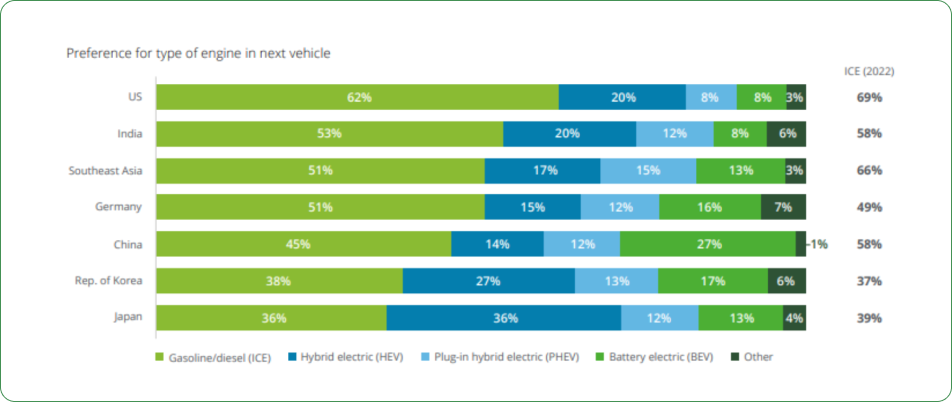11 December 2025


Electric mobility is currently a hot topic, keeping politicians, individuals and companies on their toes. Last week, the European Parliament voted to ban the sales of new combustion-powered passenger cars and light commercial vehicles (LCVs) from 2035. This is a major step towards electric mobility, making the EU the first and only region in the world to go all-electric! However, in order to support this transition, a massive deployment of charging infrastructures is necessary. Many players are active in this niche market, such as IECharge.
As carbon-free mobility solutions gain momentum, the consulting firm Deloitte published a study on automobile trends. To carry out this survey, 26.000 people from 24 countries were interviewed, including in France. The first conclusion of this report is clear: worldwide, a shift towards electric mobility is taking place. Simultaneously, consumer interest in electric vehicles (EVs) is growing strongly.

However, the motivations that drive users to buy an EV are not necessarily the ones expected. While governments emphasize the need for concrete actions against climate change, it is first and foremost the savings in fuel costs that convince drivers to turn to electric mobility. The driving experience, government subsidies and less maintenance are the other arguments that justify the switch to electric vehicles. Concerns about climate change come in 5th place.
One of the main obstacles to the adoption of an EV is related to concerns about the vehicle’s range and the number of charging options available on the road. In addition, drivers do not want to spend too much time charging their vehicles when they make a long trip. High-power charging solutions therefore have a card to play in the growing electric mobility market.
“While governments emphasize the need for concrete actions against climate change, it is first and foremost the savings in fuel costs that convince drivers to turn to electric mobility.”
-Quote by Name Surname
IECharge aims to offer a reliable, easy-to-use, efficient and digital charging solution in rural and suburban areas. By offering charging stations in areas with little or no charging infrastructure, the company is responding to the concerns of consumers, who want to have many charging points during their journey, especially in less densely populated areas. In addition, IECharge’s offer aims to encourage the adoption of EVs by future users, by proposing the most affordable charging rate on the market, at 0.30€/kWh.
IECharge aims to offer a reliable, easy-to-use, efficient and digital charging solution in rural and suburban areas. By offering charging stations in areas with little or no charging infrastructure, the company is responding to the concerns of consumers, who want to have many charging points during their journey, especially in less densely populated areas. In addition, IECharge’s offer aims to encourage the adoption of EVs by future users, by proposing the most affordable charging rate on the market, at 0.30€/kWh.
The main conclusions of the Deloitte report are the importance of rapidly deploying high-power charging infrastructure on a large scale. This is part of IECharge’s mission, which aims to democratize electric charging in rural and suburban areas.
In France, first, and then well beyond!
environ pour recharger jusqu’à 300 km d’autonomie (selon le véhicule)
soit env. 15 euros pour une charge complète, le tarif le plus abordable du marché
environ pour recharger jusqu’à 300 km d’autonomie (selon le véhicule)